Hydrogen vs. Diesel Generators: Which Is Better for the Environment?
Generators play a vital role in powering remote locations and backup systems where electricity isn’t readily available. Traditionally, diesel generators have dominated the market due to their reliability and widespread use. However, growing environmental concerns have put hydrogen-powered generator technology in the spotlight as a cleaner, more sustainable alternative. So, when comparing hydrogen vs diesel generators, which one truly has the edge in terms of environmental impact? Let’s break it down.
Key Takeaways
- Diesel generators cause a lot of pollution, both from emissions and noise, and their future looks pretty limited.
- Hydrogen powered generator systems produce no harmful emissions and are much quieter, making them a cleaner choice.
- While hydrogen powered generator solutions might cost more upfront, their long-term benefits and lower maintenance could make them a smart investment.
- Things like fuel storage and how easy it is to get hydrogen are still challenges, but the technology is getting better.
- HVO acts as a good temporary fuel, helping reduce carbon output for existing diesel generators while we move towards hydrogen and other cleaner options.
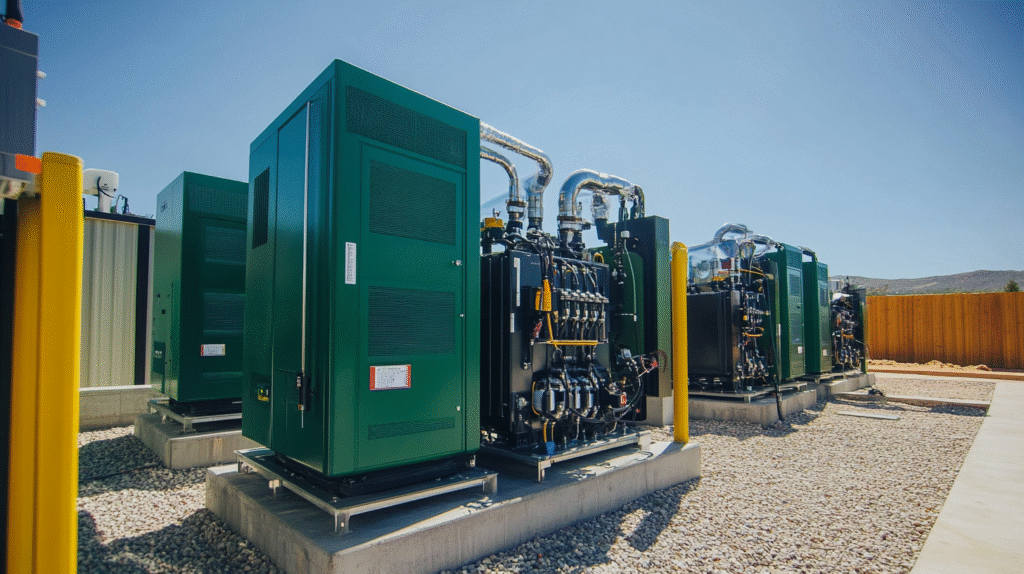
Understanding Diesel Generator Environmental Impact
Diesel generators, while reliable for backup power, carry a significant environmental impact of hydrogen vs diesel generators. It’s important to understand these effects as we explore diesel generator alternatives for clean energy solutions.
Emissions and Air Quality Concerns
Diesel generators release a cocktail of pollutants into the air. These include particulate matter, nitrogen oxides, and carbon monoxide, all of which contribute to respiratory problems and smog. The burning of diesel fuel releases an average of 2.7kg of CO2 gas along with other greenhouse gasses such as nitrogen oxides. When considering the full well to site power, this increases to 3.8kg. These emissions not only affect local air quality but also contribute to global warming.
Noise Pollution from Diesel Generators
Beyond air pollution, diesel generators are notoriously noisy. The constant drone can be disruptive to communities and wildlife. Noise pollution can lead to stress, sleep disturbances, and other health issues. The noise factor alone is pushing many to seek quieter alternatives.
The Limited Future of Diesel Generators
The future looks bleak for diesel generators. With increasing regulations aimed at reducing CO2, noise, and air pollution, many older models may soon be obsolete. The focus is shifting towards cleaner energy sources, making diesel a less viable long-term option. As more industries focus on reducing emissions, diesel generators will not help to reach those net zero goals.
Here are some reasons why diesel generators have a limited future:
- Stringent emissions regulations
- Growing demand for cleaner energy
- Advancements in alternative power technologies
The Advantages of Hydrogen Powered Generator Technology

Diesel generators have been the go-to for backup power for ages, but they come with a lot of environmental baggage. Hydrogen generators? They’re a whole different story. Let’s break down why they’re gaining traction.
Zero Emissions and Harmless Byproducts
The biggest win with hydrogen is its clean operation. Unlike diesel, which spews out greenhouse gases and other pollutants, hydrogen’s only byproduct is water. Seriously, the water produced is so clean, astronauts have used it as drinking water on space missions. That’s a far cry from the environmental damage caused by diesel, from refining to exhaust. It’s also non-toxic, so there’s minimal risk to human health or the environment. This is a game-changer, especially as we try to meet net zero goals.
Reduced Noise Levels of Hydrogen Powered Generator
Another plus? Hydrogen generators are much quieter. Diesel generators can be incredibly noisy, which is a problem on construction sites or film sets. Noise pollution can lead to shutdowns or extra costs for post-production editing. Hydrogen fuel cells operate without all that racket, making them a better choice for noise-sensitive environments. It’s a big deal for improving working conditions and keeping projects on track. The reduced noise is a welcome change.
Lower Maintenance for Hydrogen Powered Generator Systems
Maintenance is another area where hydrogen shines. Diesel generators have tons of moving parts that wear down over time, requiring regular lubrication and servicing. Hydrogen fuel cells, on the other hand, have fewer moving parts. This means less wear and tear, reduced maintenance, and lower overall costs. It’s a simpler system that’s easier to manage in the long run.
Switching to hydrogen isn’t just about being green; it’s about saving money and reducing hassle. The lack of complex parts translates to less downtime and fewer repairs, making hydrogen a smart choice for anyone looking for a reliable and cost-effective power solution.
Challenges and Considerations for Hydrogen Powered Generator Adoption
Initial Cost of Hydrogen Powered Generator Solutions
Let’s be real, the upfront cost is a big hurdle. Hydrogen powered generators often come with a higher price tag compared to traditional diesel options. This is due to the current state of the technology and the relatively low production volumes. It’s like buying the latest gadget – you pay a premium for being an early adopter. However, it’s important to consider the long-term savings in maintenance and fuel costs, which can offset the initial investment over time. Plus, as technology advances and production scales up, we can expect these costs to come down.
Scaling Up Hydrogen Infrastructure
One of the biggest roadblocks to widespread hydrogen adoption is the lack of a robust infrastructure. We need more hydrogen production facilities, efficient storage solutions, and a reliable distribution network. Think about it – you can’t just pull up to any gas station and fill up your hydrogen-powered generator. This is a chicken-and-egg situation: demand needs to increase to justify infrastructure investment, but infrastructure needs to be in place to support demand. It’s a challenge, but one that’s being actively addressed with pilot projects and government initiatives. For example, sustainable generator options for off-grid living are being explored to reduce reliance on traditional grids.
Energy Security with Hydrogen Powered Generator
Hydrogen offers a path to greater energy independence, but it’s not without its own set of considerations. Where does the hydrogen come from? Is it produced domestically, or are we reliant on imports? What happens if there are disruptions to the supply chain? These are important questions to ask when evaluating the energy security implications of hydrogen. The good news is that hydrogen can be produced from a variety of sources, including renewable energy, which can help to diversify our energy mix and reduce our dependence on fossil fuels.
Transitioning to hydrogen power requires careful planning and a strategic approach. It’s not a simple swap-out of one fuel for another. We need to consider the entire ecosystem, from production to distribution to end-use, to ensure a secure and sustainable energy future.
Comparing Operational Aspects: Hydrogen Powered Generator Versus Diesel
Fuel Storage and Availability
When it comes to fuel, diesel has a well-established infrastructure. Diesel fuel is readily available across the globe, and storage solutions are mature and widely understood. You can find diesel at almost any gas station, and storing it on-site is relatively straightforward, though regulations apply. Hydrogen, on the other hand, faces significant hurdles. While hydrogen production is increasing, its availability is still limited, and the infrastructure for distribution is not as developed. Storing hydrogen hydrogen energy also presents challenges due to its low density, requiring either high-pressure tanks or cryogenic storage, both of which add to the complexity and cost.
Generator Size and Power Output Options
Diesel generators come in a wide range of sizes and power outputs, making them suitable for diverse applications, from small residential needs to large industrial operations. You can easily find a diesel generator that matches your specific power requirements. Hydrogen generators are still evolving in terms of scalability. While smaller units are becoming more accessible, larger, high-power hydrogen generators are less common and often custom-built. This can limit your options if you need a very large power output. The question of comparing emissions from diesel and hydrogen generators becomes crucial when considering the environmental impact of different power outputs.
Long-Term Investment Decisions
Choosing between a hydrogen and diesel generator involves considering the long-term costs and benefits. Diesel generators have a lower upfront cost, but their operational expenses, including fuel and maintenance, can be high. Plus, with increasing environmental regulations, the long-term viability of diesel may be questionable. Hydrogen generators have a higher initial investment, but lower operational costs due to reduced maintenance and potentially cheaper fuel (depending on hydrogen production methods). The environmental benefits of hydrogen can also translate to long-term cost savings through carbon credits and avoided pollution penalties.
Ultimately, the choice depends on your specific needs, budget, and environmental goals. If cost is the only factor, diesel might seem appealing in the short term. However, considering the environmental impact and the direction of global energy policy, investing in hydrogen could be a smarter move for the future. The question of is a hydrogen generator more eco-friendly than diesel? is becoming increasingly important in long-term investment decisions.
Here’s a simple comparison table:
| Feature | Diesel Generator | Hydrogen Generator |
|---|---|---|
| Fuel Availability | Widespread | Limited, developing infrastructure |
| Storage | Simple, well-established | Complex, high-pressure or cryogenic |
| Size/Power Output | Wide range | Smaller range, scaling up challenges |
| Upfront Cost | Lower | Higher |
| Operational Costs | Higher (fuel, maintenance) | Lower (less maintenance, cheaper fuel potential) |
| Environmental Impact | High (emissions, noise) | Low (zero emissions, reduced noise) |
The Role of HVO as a Transitional Fuel
HVO: A Bridge to Cleaner Energy
HVO, or Hydrotreated Vegetable Oil, is gaining traction as a transitional fuel in the shift away from traditional diesel. It offers a way to reduce emissions without immediately overhauling existing infrastructure. Think of it as a stepping stone, allowing businesses and individuals to lessen their environmental impact while preparing for more sustainable long-term solutions like hydrogen. It’s becoming easier to find local suppliers across the country.
Compatibility with Existing Diesel Gensets
One of the biggest advantages of HVO is its compatibility. You can use it in your current diesel generators without needing to make any modifications. This “drop-in” capability makes it a convenient option for those looking to reduce their carbon footprint without significant upfront investment. It’s a pretty straightforward switch, which is always a plus. Here are some benefits:
- No engine modifications needed
- Seamless transition from diesel
- Reduced downtime for fuel switch
Significant CO2 Reduction Potential
While not entirely carbon-neutral, HVO offers a significant reduction in CO2 emissions compared to regular diesel. The exact percentage is debated, but many sources claim up to a 90% reduction on a lifecycle basis. Even if the real number is lower, it’s still a step in the right direction. It’s important to remember that HVO still produces some emissions, so it won’t meet all low emission zone requirements. However, with diesel generators being a popular choice, HVO is a good alternative.
HVO is produced from renewable sources like used cooking oils and vegetable oils. The idea is that the CO2 emitted when it’s burned is offset by the CO2 absorbed by the plants during their growth. This makes it a lower-carbon option, although the sustainability of the sources is something to keep an eye on.
Regulatory Landscape and Net Zero Goals
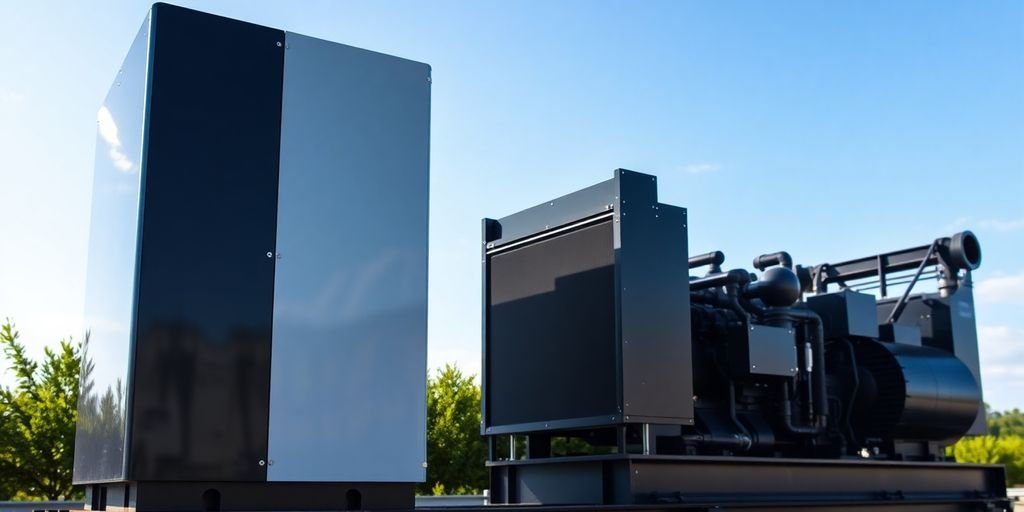
Global Emissions Regulations Impact
Global emissions regulations are really starting to shake things up. It’s not just about feeling good anymore; there are real consequences for sticking with older, dirtier tech. These regulations are pushing industries to look hard at their carbon footprint, and generators are definitely in the spotlight. Think of it this way: if you’re still relying on diesel, you’re not just polluting; you’re also risking fines and maybe even being shut out of certain markets. The pressure is on to clean up our act, and that means exploring alternatives like hydrogen and HVO. It’s a big shift, but it’s happening, ready or not.
Paris Agreement Principles and Generator Choices
The Paris Agreement set the stage for a global push toward net-zero emissions, and it’s influencing decisions at every level. The agreement’s focus on reducing greenhouse gases means that businesses need to seriously consider the environmental impact of their energy sources. Generator choices are no exception. Diesel generators, with their high emissions, are increasingly out of sync with the goals of the Paris Agreement. Hydrogen generators, on the other hand, align perfectly with the vision of a cleaner, more sustainable future. It’s about making choices that not only meet your power needs but also contribute to a healthier planet.
Avoiding Outdated Generator Issues
Sticking with outdated generator technology can lead to a whole host of problems down the road. It’s not just about emissions; it’s also about efficiency, maintenance, and long-term costs. Here’s a few things to consider:
- Rising fuel costs: Diesel prices can fluctuate wildly, making it hard to budget.
- Stricter regulations: As emissions standards get tougher, older generators may become obsolete.
- Maintenance headaches: Older equipment tends to break down more often, leading to costly repairs and downtime.
Investing in newer, cleaner generator technology, like Bosch’s SOFC units, can help you avoid these issues and ensure that you’re prepared for the future. It’s about making a smart investment that pays off in the long run, both for your business and for the environment.
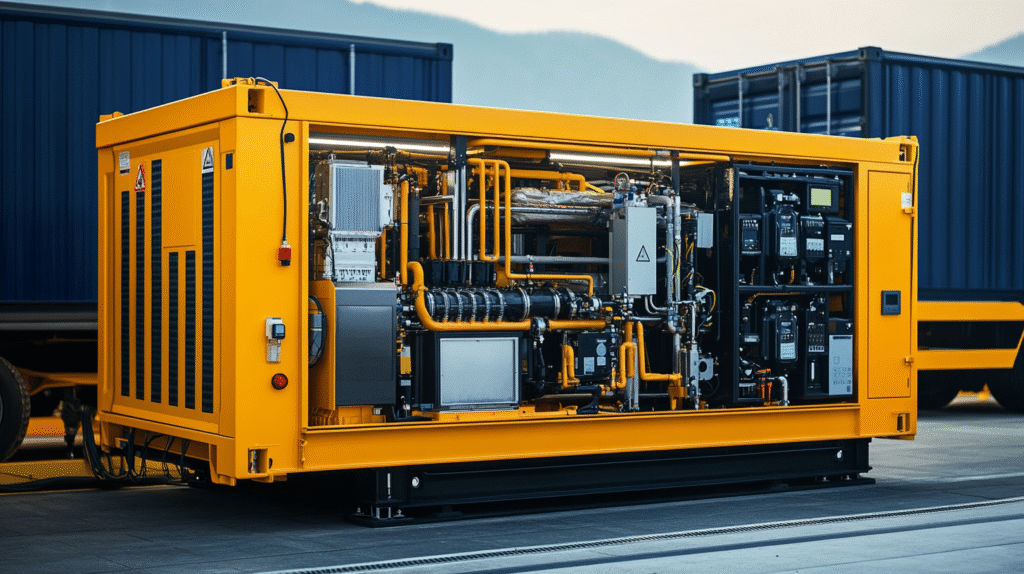
Wrapping Things Up
So, when you look at diesel versus hydrogen generators, it’s pretty clear which way the wind is blowing. Diesel has been around forever, and yeah, it’s easy to find and pretty cheap upfront. But it’s also loud, dirty, and just not good for the planet. All that pollution it spits out? Not ideal for our air or our long-term goals.
Hydrogen, on the other hand, is the new kid on the block, and it’s got some serious advantages. It’s quiet, doesn’t put out any harmful stuff, and it’s a big step toward a cleaner future. Sure, it might cost a bit more right now, but as technology gets better and more people start using it, those prices will come down. For anyone serious about cutting down on pollution and being more eco-friendly, hydrogen is definitely the way to go. It just makes sense for the future.
Frequently Asked Questions
What’s wrong with using diesel generators?
Diesel generators make a lot of noise and release harmful stuff into the air, like greenhouse gases and tiny particles. This pollutes our air and can cause health problems. They also make a lot of noise, which can be annoying for people and bad for animals.
How are hydrogen generators better for the environment?
Hydrogen generators are much cleaner. They don’t put out any harmful gases, just water vapor. They’re also much quieter than diesel ones. Plus, they usually need less fixing because they have fewer moving parts.
Are there any downsides to using hydrogen generators?
Right now, hydrogen generators can cost more to buy upfront than diesel ones. Also, we need more places to make and store hydrogen fuel so it’s easy for everyone to get.
What is HVO and why is it important?
HVO, or Hydrotreated Vegetable Oil, is a special kind of fuel made from things like used cooking oil. It’s a good step between regular diesel and hydrogen because it can be used in many diesel generators and cuts down on pollution a lot.
How do new environmental rules affect generator choices?
Many countries are making rules to reduce pollution and reach
Which type of generator should I choose?
Choosing between hydrogen and diesel depends on what you need. If you want to be as clean as possible and don’t mind a higher initial cost, hydrogen is great. If you need something cheaper right now and can use HVO, that’s a good temporary solution.

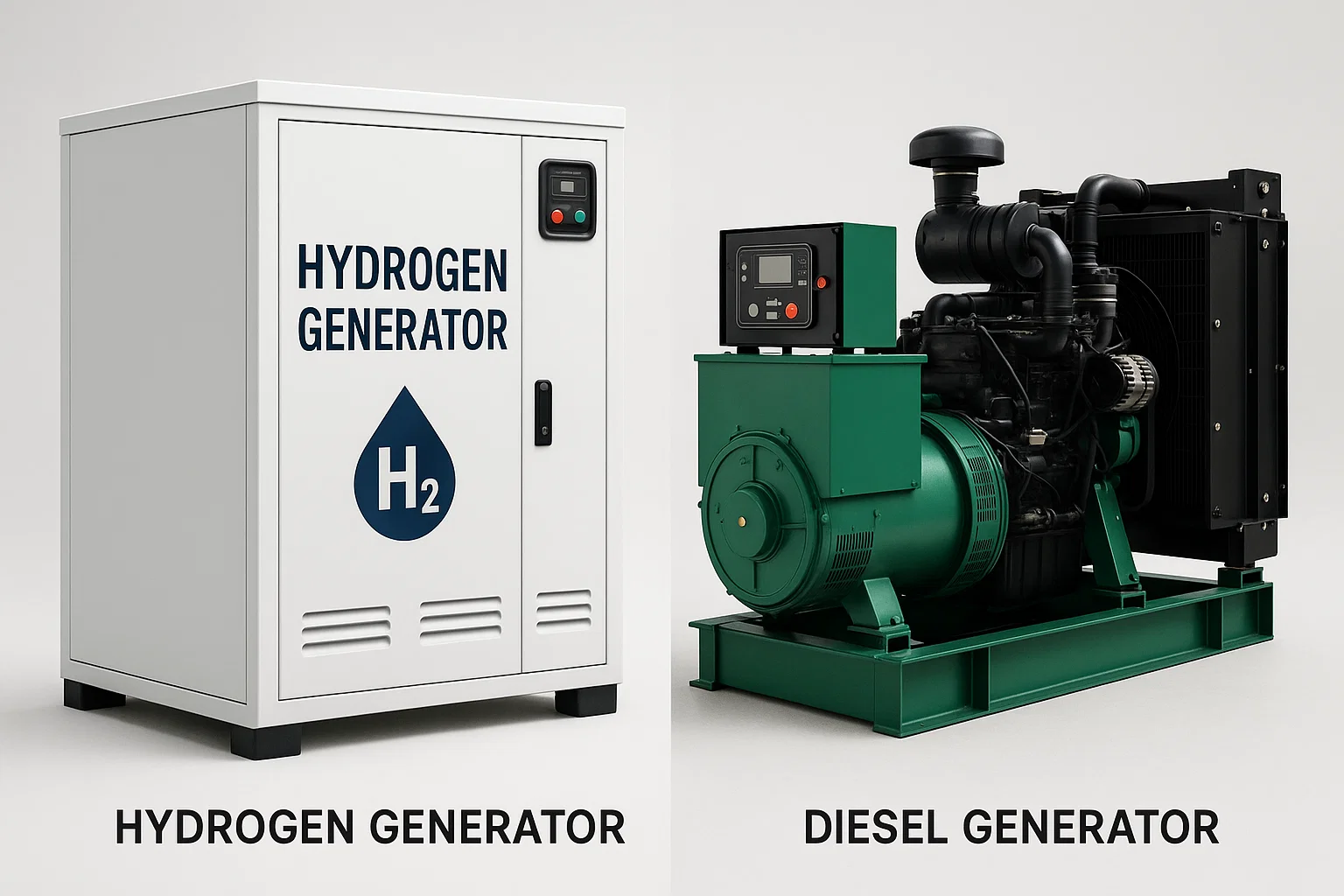
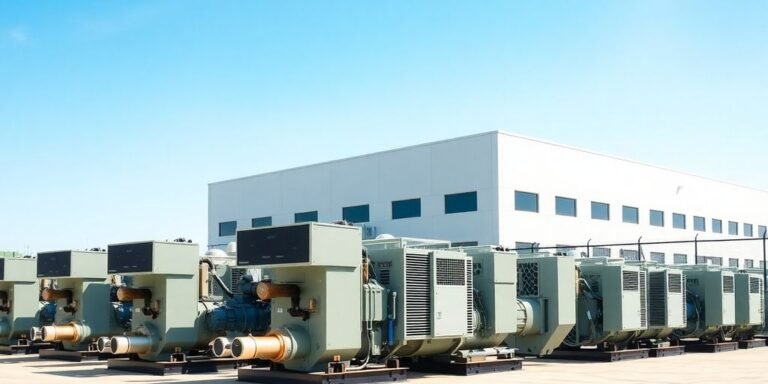
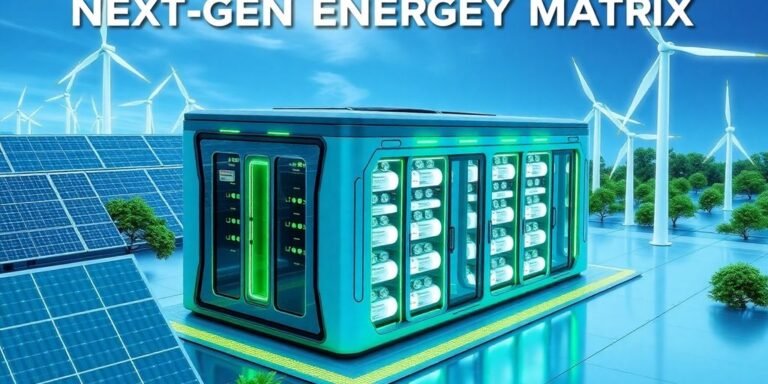
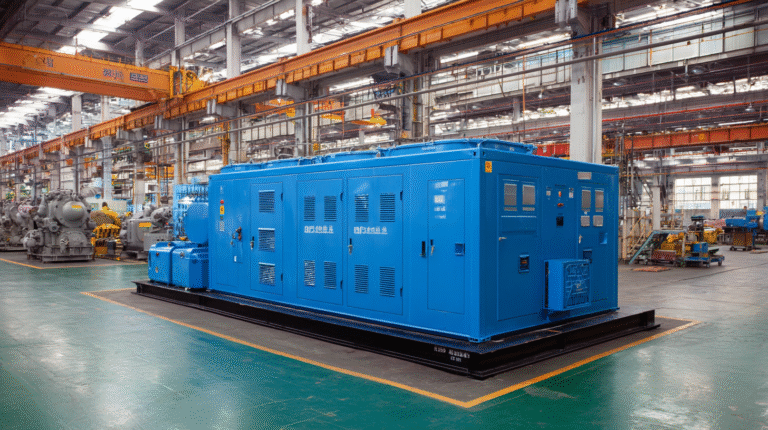
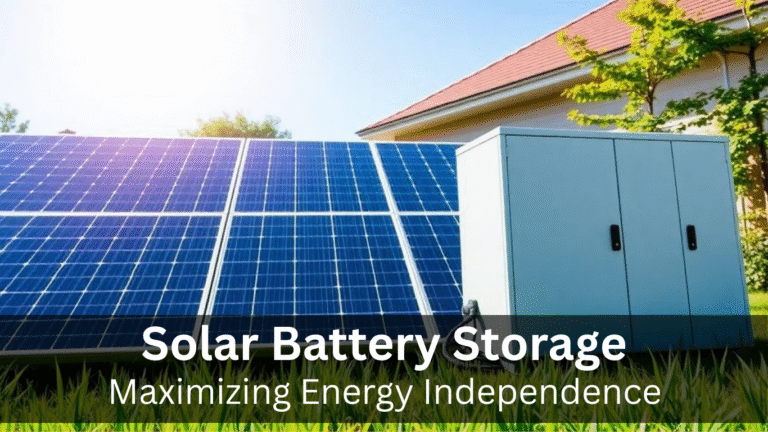



3 Comments